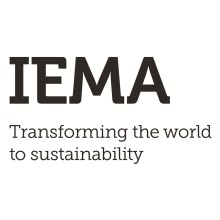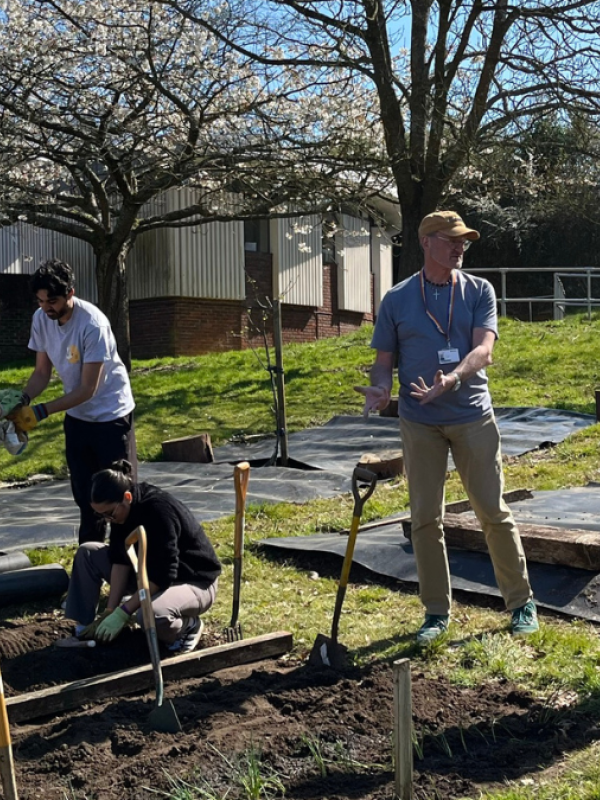
- Corporate Environmental Management
MSc — 2026 entry Corporate Environmental Management
Our Corporate Environmental Management MSc degree covers all aspects of managing environmental and sustainability strategy within corporate settings. This course will focus on providing you with a thorough understanding of issues crucial to the sustainable development debate.
4,138+ people have created a bespoke digital prospectus
Why choose
this course?
This course is run by our Centre for Environment and Sustainability (CES) and the Institute for Sustainability, and in partnership with the new Surrey CIFAL – a United Nations Institute for Training and Research (UNITAR) training centre recently established at the University of Surrey.
This course will prepare you for your future as an environmental and sustainability professional. You'll become an expert on the challenges being faced by the corporate world, and what corporate social responsibility actually means on a local, national and international level.
You'll also have the opportunity to undertake a postgraduate placement year if you choose our placement pathway, allowing you to gain crucial workplace experience. We’ll support you in finding a placement with a company most suited to your career goals.
Accreditation

What you will study
From carbon footprints to the design of revolutionary environmentally friendly products, our MSc covers all aspects of environmental management for business and sustainability strategy in organisations.
We’ll provide you with an in-depth understanding of all the issues crucial to the sustainable development debate. You’ll consider the views of competing stakeholders such as business groups, environmentalists, government agencies and development institutions.
You’ll evaluate existing frameworks, inquire into environmental issues in organisations and industries, and develop sensitive business practices, preparing you for any corporate-focused environmental career.
You’re free to choose your own dissertation topic and a series of seminar events will be held to help you refine your ideas and make a start. Most students choose topics related to issues or ideas encountered in the taught modules, or in a professional context, which relates to environment or sustainability. You’ll be allocated a dissertation supervisor to help guide you through the dissertation process.
Our Corporate Environmental Management MSc provides you with a route to the Institute of Environmental Management and Assessment graduate membership.
Professional recognition
MSc - Institution of Environmental Management and Assessment (IEMA).
Accredited by the Institute of Environmental Management and Assessment (IEMA) for the purpose of eligibility to apply for graduate membership
Guest lecturers
Several high-profile guest lecturers assist with the teaching of some of the modules. We make maximum use of guest lecturers, drawing on the practical skills and experience of major experts from government and industry to complement the theoretical components of the modules offered.
Recent guest speakers have come from leading organisations such as:
- Ardent Consulting Engineers
- Aviva Investors
- Climate Action
- Ikea
- Keller
- Modulaire Group
- Natural England
- NHS Property Services
- Sony Computer Entertainment
- Surrey Wildlife Trust
- United Nations Environment Programme
- WRAP.
This course is normally completed in one year on a full-time basis or between two and five years when completed on a part-time basis. You can start this MSc at the beginning of either the first semester in September or the second semester in February.
The academic year begins with welcome week when students are introduced to the University and full-time students choose their elective modules. If you’re a part-time student, you can enrol in modules closer to the time you wish to take them.
Students must complete five compulsory modules and four elective modules by the end of their masters. The dissertation forms one of the compulsory modules.
You will work on your dissertation in Semester 2 into the summer, if you start your course in September. If you start your course in February, we encourage you to work on your dissertation in Semesters 1 and 2, finishing in the summer.
The structure of our programmes follows clear educational aims that are tailored to each programme. These are all outlined in the programme specifications which include further details such as the learning outcomes:
Modules
Modules listed are indicative, reflecting the information available at the time of publication. Modules are subject to teaching availability, student demand and/or class size caps.
The University operates a credit framework for all taught programmes based on a 15-credit tariff, meaning all modules are comprised of multiples of 15 credits.
Course options
Year 1
Semester 1
Compulsory
When considering how to reduce the environmental impacts of a product, a service, an organisation, a household or even a nation, it is vital to take a life cycle approach. A life cycle approach considers the environmental impact over the full life cycle of the product– from its design, raw material extraction, manufacturing, distribution, consumption and then disposal or recycling at the end of the product’s life. In this module we introduce participants to life cycle thinking, the concept of the circular economy, life cycle management and related environmental systems analysis approaches. We consider how such approaches can help inform sustainability trade-offs, thus leading to better-informed decisions.
View full module detailsThe dominant approach towards identifying, documenting and minimising the effects an organisation has on its specific and the wider (physical and to some extent social) environment is originated in the Total Quality Management (TQM) Movement. Auditing as the systematic process of performance evaluation against pre-set standards, as well the need to embed all activities into a contrived system of managing activities are at the heart of environmental management. They are also at the heart of this module, which has the purpose of introducing environmental auditing and environmental management systems in a practical, informative and useful manner. The course will explore the dominant, practical and topical concerns surrounding environmental auditing and environmental management systems. It is one of the components required for the Associate Membership of IEMA.
View full module detailsThe course evaluates and discusses the way environmental and social concerns have affected organisations in the private sector, and how such organisations have affected the content, shape and direction of the public debate. Particular emphasis will be paid to corporate sustainability strategies, the distribution and organisation of roles within an organisation, the contribution of different departments, as well as the industrial perspective towards industrial ecology and sustainable consumption.
View full module detailsOptional
This module provides an overview of the environmental sciences which underpin sustainable development. It explores theoretical concepts from the physical and natural sciences and considers their relevance for sustainable development. These include ecological systems and ecosystem services, biodiversity and biodiversity loss, environmental measurements and indicators, agriculture and pollution impacts, and climate change and energy. Students will explore how to conduct an environmental risk assessment in a real-life scenario, and learn about enacting environmental policy at international, national and local levels.
View full module detailsThis is an elective module normally only available for full-time MSc students, and is intended to complement the students’ academic work with valuable practical experience in industry, government agencies, non-governmental organizations (NGO) or environmental research centers. The Internship offers students a unique opportunity to gain hands-on and meaningful work experience, learn how to work co-operatively with others, obtain a better perspective of careers in the environmental and sustainability field and enhance employment opportunities. Students will work on specific projects at, or in association with, their internship organisation and will have the opportunity to use and test some of the analytical skills they acquired from their MSc programme. NOTE on overall student workload: Independent Learning Hours at 225 reflects standard University contract hours per week x 6 weeks), Lecture and Seminar hours are 2 and 4 respectively. These 231 hours reflect a supervised, experiential learning module delivered as an Internship placement over an equivalent 6 weeks full-time with an outside organisation. While the hours differ from the standard150 hours per 15 credit module, the nature and value of the experience is equivalent to a standard module but is acquired over a somewhat longer period of immersion. This has proved extremely popular with students, is highly valuable/appreciated re: future career prospects, is an outstanding opportunity to reflect broadly on the learning experience from their whole MSc course, and affords a unique observation of how sustainability knowledge applies in practice. We strongly support this module and its equivalence in learning experience to other ‘typical’ HFEQ Level 7 modules
View full module detailsThis module provides a trans-disciplinary exposition and discussion of the core concepts of Sustainable Development, covering economic, political, ethical, social and ecological dimensions. It also reflects on the real-life application of the concept in organisations across sectors and scales, focusing on policies, strategies, performance and governance. It is aimed at a wide range of students and is suitable as a foundation for students who have not previously studied sustainability. It provides a grounding to the concepts but also raises awareness of the leading-edge challenges in the integration and implementation of sustainable development in reality.
View full module detailsSemester 2
Compulsory
The module provides study of the law relevant to environmental pollution.
View full module detailsOptional
This course will introduce the basic insights of ecological economics – that is an economics grounded in ecological realities - and situate these in the context of historical and current debates about economics and prosperity on a finite planet.
View full module detailsEnergy use and the systems put in place to supply it are responsible for the majority of the world’s emissions of carbon dioxide and hence much climate change policy is directed towards the energy sector. Energy is also central to economic development and social welfare and thus energy security and cost minimisation are high on national policy agendas. Energy markets throughout the world are also evolving rapidly, with privatisation, competition, market structure and regulation remaining prominent issues in the UK, Europe and internationally. The range of challenges for energy policy is diverse and exciting. This Module focuses on the transitions needed from the current situations in energy use, supply, markets and policy to those required as part of a long term, sustainable, low carbon energy system. The sessions will introduce the range of low carbon energy options including energy efficiency, energy storge, renewables, nuclear and carbon capture and storage. The module will explore different low-carbon scenarios and policies and how these could fit with the Sustainable Development Goals, and what barriers maybe encountered along the route to a just transition, in both the global North and South.
View full module detailsLife Cycle Assessment (LCA) is a robust and systematic methodology to evaluate and analyse environmental impacts of a product or service system across its whole life cycle. This module aims to develop skills in the LCA methodology by providing in-depth training on LCA methodology, and practical experience of doing an LCA on SimaPro software.
View full module detailsThis is an elective module normally only available for full-time MSc students, and is intended to complement the students’ academic work with valuable practical experience in industry, government agencies, non-governmental organizations (NGO) or environmental research centers. The Internship offers students a unique opportunity to gain hands-on and meaningful work experience, learn how to work co-operatively with others, obtain a better perspective of careers in the environmental and sustainability field and enhance employment opportunities. Students will work on specific projects at, or in association with, their internship organisation and will have the opportunity to use and test some of the analytical skills they acquired from their MSc programme. NOTE on overall student workload: Independent Learning Hours at 225 reflects standard University contract hours per week x 6 weeks), Lecture and Seminar hours are 2 and 4 respectively. These 231 hours reflect a supervised, experiential learning module delivered as an Internship placement over an equivalent 6 weeks full-time with an outside organisation. While the hours differ from the standard150 hours per 15 credit module, the nature and value of the experience is equivalent to a standard module but is acquired over a somewhat longer period of immersion. This has proved extremely popular with students, is highly valuable/appreciated re: future career prospects, is an outstanding opportunity to reflect broadly on the learning experience from their whole MSc course, and affords a unique observation of how sustainability knowledge applies in practice. We strongly support this module and its equivalence in learning experience to other ‘typical’ HFEQ Level 7 modules
View full module detailsThis module introduces students to psychological perspectives on understanding and addressing environmental and sustainability challenges. The module provides an overview of theoretical formulations and research evidence related to 1) people’s understandings and perceptions of environmental risks, 2) environmental and materialistic values, 3) environment and wellbeing, and 4) pro-environmental behaviour change. The module is based on the research-practitioner model and aims to enable students to develop an understanding of how psychological research can help tackle environmental challenges by drawing on empirical research evidence. By the end of the module students should have an advanced understanding of some of the principles and theoretical and methodological developments in the area, and understand the value of this knowledge for helping to tackle environmental challenges.
View full module detailsSemester 1 & 2
Compulsory
The Dissertation module provides students with an opportunity to explore a key aspect of environmental management or sustainable development in depth. By applying the knowledge, skills and expertise developed in their degree students undertake original research to answer a research question or prove a hypothesis. The research process typically involves the review of the relevant literature, developing a research methodology, data collection (or acquisition of an existing data set), data analysis and reflection. Students are encouraged to consider and apply interdisciplinary approaches in their research where appropriate, thus crossing the boundaries between disciplines to address a problem which can be better understood by applying combining research approaches from more than one discipline. Students are encouraged to identify their own dissertation topic, however the academic team may also suggest topics in their areas of expertise. Once a topic has been approved students will be assigned a supervisor with sufficient experience and academic background to provide the necessary guidance and support.
View full module detailsAcross academic years
Compulsory
The Dissertation module provides students with an opportunity to explore a key aspect of environmental management or sustainable development in depth. By applying the knowledge, skills and expertise developed in their degree students undertake original research to answer a research question or prove a hypothesis. The research process typically involves the review of the relevant literature, developing a research methodology, data collection (or acquisition of an existing data set), data analysis and reflection. Students are encouraged to consider and apply interdisciplinary approaches in their research where appropriate, thus crossing the boundaries between disciplines to address a problem which can be better understood by applying combining research approaches from more than one discipline. Students are encouraged to identify their own dissertation topic, however the academic team may also suggest topics in their areas of expertise. Once a topic has been approved students will be assigned a supervisor with sufficient experience and academic background to provide the necessary guidance and support.
View full module detailsOptional modules for Year 1 - FHEQ Level 7
Students are to take four optional modules.
Year 1
Semester 1
Compulsory
The course evaluates and discusses the way environmental and social concerns have affected organisations in the private sector, and how such organisations have affected the content, shape and direction of the public debate. Particular emphasis will be paid to corporate sustainability strategies, the distribution and organisation of roles within an organisation, the contribution of different departments, as well as the industrial perspective towards industrial ecology and sustainable consumption.
View full module detailsWhen considering how to reduce the environmental impacts of a product, a service, an organisation, a household or even a nation, it is vital to take a life cycle approach. A life cycle approach considers the environmental impact over the full life cycle of the product– from its design, raw material extraction, manufacturing, distribution, consumption and then disposal or recycling at the end of the product’s life. In this module we introduce participants to life cycle thinking, the concept of the circular economy, life cycle management and related environmental systems analysis approaches. We consider how such approaches can help inform sustainability trade-offs, thus leading to better-informed decisions.
View full module detailsThe dominant approach towards identifying, documenting and minimising the effects an organisation has on its specific and the wider (physical and to some extent social) environment is originated in the Total Quality Management (TQM) Movement. Auditing as the systematic process of performance evaluation against pre-set standards, as well the need to embed all activities into a contrived system of managing activities are at the heart of environmental management. They are also at the heart of this module, which has the purpose of introducing environmental auditing and environmental management systems in a practical, informative and useful manner. The course will explore the dominant, practical and topical concerns surrounding environmental auditing and environmental management systems. It is one of the components required for the Associate Membership of IEMA.
View full module detailsOptional
This module provides an overview of the environmental sciences which underpin sustainable development. It explores theoretical concepts from the physical and natural sciences and considers their relevance for sustainable development. These include ecological systems and ecosystem services, biodiversity and biodiversity loss, environmental measurements and indicators, agriculture and pollution impacts, and climate change and energy. Students will explore how to conduct an environmental risk assessment in a real-life scenario, and learn about enacting environmental policy at international, national and local levels.
View full module detailsThis module provides a trans-disciplinary exposition and discussion of the core concepts of Sustainable Development, covering economic, political, ethical, social and ecological dimensions. It also reflects on the real-life application of the concept in organisations across sectors and scales, focusing on policies, strategies, performance and governance. It is aimed at a wide range of students and is suitable as a foundation for students who have not previously studied sustainability. It provides a grounding to the concepts but also raises awareness of the leading-edge challenges in the integration and implementation of sustainable development in reality.
View full module detailsSemester 2
Compulsory
The module provides study of the law relevant to environmental pollution.
View full module detailsOptional
Energy use and the systems put in place to supply it are responsible for the majority of the world’s emissions of carbon dioxide and hence much climate change policy is directed towards the energy sector. Energy is also central to economic development and social welfare and thus energy security and cost minimisation are high on national policy agendas. Energy markets throughout the world are also evolving rapidly, with privatisation, competition, market structure and regulation remaining prominent issues in the UK, Europe and internationally. The range of challenges for energy policy is diverse and exciting. This Module focuses on the transitions needed from the current situations in energy use, supply, markets and policy to those required as part of a long term, sustainable, low carbon energy system. The sessions will introduce the range of low carbon energy options including energy efficiency, energy storge, renewables, nuclear and carbon capture and storage. The module will explore different low-carbon scenarios and policies and how these could fit with the Sustainable Development Goals, and what barriers maybe encountered along the route to a just transition, in both the global North and South.
View full module detailsThis course will introduce the basic insights of ecological economics – that is an economics grounded in ecological realities - and situate these in the context of historical and current debates about economics and prosperity on a finite planet.
View full module detailsThis module introduces students to psychological perspectives on understanding and addressing environmental and sustainability challenges. The module provides an overview of theoretical formulations and research evidence related to 1) people’s understandings and perceptions of environmental risks, 2) environmental and materialistic values, 3) environment and wellbeing, and 4) pro-environmental behaviour change. The module is based on the research-practitioner model and aims to enable students to develop an understanding of how psychological research can help tackle environmental challenges by drawing on empirical research evidence. By the end of the module students should have an advanced understanding of some of the principles and theoretical and methodological developments in the area, and understand the value of this knowledge for helping to tackle environmental challenges.
View full module detailsLife Cycle Assessment (LCA) is a robust and systematic methodology to evaluate and analyse environmental impacts of a product or service system across its whole life cycle. This module aims to develop skills in the LCA methodology by providing in-depth training on LCA methodology, and practical experience of doing an LCA on SimaPro software.
View full module detailsSemester 1 & 2
Compulsory
The Dissertation module provides students with an opportunity to explore a key aspect of environmental management or sustainable development in depth. By applying the knowledge, skills and expertise developed in their degree students undertake original research to answer a research question or prove a hypothesis. The research process typically involves the review of the relevant literature, developing a research methodology, data collection (or acquisition of an existing data set), data analysis and reflection. Students are encouraged to consider and apply interdisciplinary approaches in their research where appropriate, thus crossing the boundaries between disciplines to address a problem which can be better understood by applying combining research approaches from more than one discipline. Students are encouraged to identify their own dissertation topic, however the academic team may also suggest topics in their areas of expertise. Once a topic has been approved students will be assigned a supervisor with sufficient experience and academic background to provide the necessary guidance and support.
View full module detailsThis module provides information, guidance and support for developing the student¿s employability.In addition, this module helps students build on their previous skills and generate documents that are required to demonstrate their skill sets to external parties, recruiters and recruiting agencies. Furthermore, skills acquired in this module will enable students to actively participate in placement and employment searches.
View full module detailsAcross academic years
Compulsory
This module provides information, guidance and support for developing the student¿s employability.In addition, this module helps students build on their previous skills and generate documents that are required to demonstrate their skill sets to external parties, recruiters and recruiting agencies. Furthermore, skills acquired in this module will enable students to actively participate in placement and employment searches.
View full module detailsThe Dissertation module provides students with an opportunity to explore a key aspect of environmental management or sustainable development in depth. By applying the knowledge, skills and expertise developed in their degree students undertake original research to answer a research question or prove a hypothesis. The research process typically involves the review of the relevant literature, developing a research methodology, data collection (or acquisition of an existing data set), data analysis and reflection. Students are encouraged to consider and apply interdisciplinary approaches in their research where appropriate, thus crossing the boundaries between disciplines to address a problem which can be better understood by applying combining research approaches from more than one discipline. Students are encouraged to identify their own dissertation topic, however the academic team may also suggest topics in their areas of expertise. Once a topic has been approved students will be assigned a supervisor with sufficient experience and academic background to provide the necessary guidance and support.
View full module detailsYear 2
Across academic years
Compulsory
This module supports students¿ development of personal and professional attitudes and abilities appropriate to an industrial practice training placement. It supports and facilitates self-reflection and transfer of learning from student¿s industrial placement experiences to their future employment. The industrial practice module is concerned with personal and professional development towards holistic academic and non-academic learning, and is a process that involves self-reflection, documented via the creation of a personal record, planning and monitoring progress towards the achievement of personal objectives. Development and learning may occur before and during the placement, and this is reflected in the assessment model as a progressive process. However, the graded assessment takes place primarily towards the end of the placement. Additionally, the module aims to enable students to evidence and evaluate their placement experiences and transfer that learning to other situations through written and presentation skills. Each student will be assigned an academic tutor who will meet with the student a few times (virtually or face-to-face) during the placement to support the student and help them reflect on the placement.
View full module detailsOptional modules for Year 2 (full-time with placement - 2 years) - FHEQ Level 7
Unstructured years
Semester 1
Compulsory
When considering how to reduce the environmental impacts of a product, a service, an organisation, a household or even a nation, it is vital to take a life cycle approach. A life cycle approach considers the environmental impact over the full life cycle of the product– from its design, raw material extraction, manufacturing, distribution, consumption and then disposal or recycling at the end of the product’s life. In this module we introduce participants to life cycle thinking, the concept of the circular economy, life cycle management and related environmental systems analysis approaches. We consider how such approaches can help inform sustainability trade-offs, thus leading to better-informed decisions.
View full module detailsThe dominant approach towards identifying, documenting and minimising the effects an organisation has on its specific and the wider (physical and to some extent social) environment is originated in the Total Quality Management (TQM) Movement. Auditing as the systematic process of performance evaluation against pre-set standards, as well the need to embed all activities into a contrived system of managing activities are at the heart of environmental management. They are also at the heart of this module, which has the purpose of introducing environmental auditing and environmental management systems in a practical, informative and useful manner. The course will explore the dominant, practical and topical concerns surrounding environmental auditing and environmental management systems. It is one of the components required for the Associate Membership of IEMA.
View full module detailsThe course evaluates and discusses the way environmental and social concerns have affected organisations in the private sector, and how such organisations have affected the content, shape and direction of the public debate. Particular emphasis will be paid to corporate sustainability strategies, the distribution and organisation of roles within an organisation, the contribution of different departments, as well as the industrial perspective towards industrial ecology and sustainable consumption.
View full module detailsOptional
This module provides an overview of the environmental sciences which underpin sustainable development. It explores theoretical concepts from the physical and natural sciences and considers their relevance for sustainable development. These include ecological systems and ecosystem services, biodiversity and biodiversity loss, environmental measurements and indicators, agriculture and pollution impacts, and climate change and energy. Students will explore how to conduct an environmental risk assessment in a real-life scenario, and learn about enacting environmental policy at international, national and local levels.
View full module detailsThis is an elective module normally only available for full-time MSc students, and is intended to complement the students’ academic work with valuable practical experience in industry, government agencies, non-governmental organizations (NGO) or environmental research centers. The Internship offers students a unique opportunity to gain hands-on and meaningful work experience, learn how to work co-operatively with others, obtain a better perspective of careers in the environmental and sustainability field and enhance employment opportunities. Students will work on specific projects at, or in association with, their internship organisation and will have the opportunity to use and test some of the analytical skills they acquired from their MSc programme. NOTE on overall student workload: Independent Learning Hours at 225 reflects standard University contract hours per week x 6 weeks), Lecture and Seminar hours are 2 and 4 respectively. These 231 hours reflect a supervised, experiential learning module delivered as an Internship placement over an equivalent 6 weeks full-time with an outside organisation. While the hours differ from the standard150 hours per 15 credit module, the nature and value of the experience is equivalent to a standard module but is acquired over a somewhat longer period of immersion. This has proved extremely popular with students, is highly valuable/appreciated re: future career prospects, is an outstanding opportunity to reflect broadly on the learning experience from their whole MSc course, and affords a unique observation of how sustainability knowledge applies in practice. We strongly support this module and its equivalence in learning experience to other ‘typical’ HFEQ Level 7 modules
View full module detailsThis module provides a trans-disciplinary exposition and discussion of the core concepts of Sustainable Development, covering economic, political, ethical, social and ecological dimensions. It also reflects on the real-life application of the concept in organisations across sectors and scales, focusing on policies, strategies, performance and governance. It is aimed at a wide range of students and is suitable as a foundation for students who have not previously studied sustainability. It provides a grounding to the concepts but also raises awareness of the leading-edge challenges in the integration and implementation of sustainable development in reality.
View full module detailsSemester 2
Compulsory
The module provides study of the law relevant to environmental pollution.
View full module detailsOptional
This course will introduce the basic insights of ecological economics – that is an economics grounded in ecological realities - and situate these in the context of historical and current debates about economics and prosperity on a finite planet.
View full module detailsEnergy use and the systems put in place to supply it are responsible for the majority of the world’s emissions of carbon dioxide and hence much climate change policy is directed towards the energy sector. Energy is also central to economic development and social welfare and thus energy security and cost minimisation are high on national policy agendas. Energy markets throughout the world are also evolving rapidly, with privatisation, competition, market structure and regulation remaining prominent issues in the UK, Europe and internationally. The range of challenges for energy policy is diverse and exciting. This Module focuses on the transitions needed from the current situations in energy use, supply, markets and policy to those required as part of a long term, sustainable, low carbon energy system. The sessions will introduce the range of low carbon energy options including energy efficiency, energy storge, renewables, nuclear and carbon capture and storage. The module will explore different low-carbon scenarios and policies and how these could fit with the Sustainable Development Goals, and what barriers maybe encountered along the route to a just transition, in both the global North and South.
View full module detailsLife Cycle Assessment (LCA) is a robust and systematic methodology to evaluate and analyse environmental impacts of a product or service system across its whole life cycle. This module aims to develop skills in the LCA methodology by providing in-depth training on LCA methodology, and practical experience of doing an LCA on SimaPro software.
View full module detailsThis is an elective module normally only available for full-time MSc students, and is intended to complement the students’ academic work with valuable practical experience in industry, government agencies, non-governmental organizations (NGO) or environmental research centers. The Internship offers students a unique opportunity to gain hands-on and meaningful work experience, learn how to work co-operatively with others, obtain a better perspective of careers in the environmental and sustainability field and enhance employment opportunities. Students will work on specific projects at, or in association with, their internship organisation and will have the opportunity to use and test some of the analytical skills they acquired from their MSc programme. NOTE on overall student workload: Independent Learning Hours at 225 reflects standard University contract hours per week x 6 weeks), Lecture and Seminar hours are 2 and 4 respectively. These 231 hours reflect a supervised, experiential learning module delivered as an Internship placement over an equivalent 6 weeks full-time with an outside organisation. While the hours differ from the standard150 hours per 15 credit module, the nature and value of the experience is equivalent to a standard module but is acquired over a somewhat longer period of immersion. This has proved extremely popular with students, is highly valuable/appreciated re: future career prospects, is an outstanding opportunity to reflect broadly on the learning experience from their whole MSc course, and affords a unique observation of how sustainability knowledge applies in practice. We strongly support this module and its equivalence in learning experience to other ‘typical’ HFEQ Level 7 modules
View full module detailsThis module introduces students to psychological perspectives on understanding and addressing environmental and sustainability challenges. The module provides an overview of theoretical formulations and research evidence related to 1) people’s understandings and perceptions of environmental risks, 2) environmental and materialistic values, 3) environment and wellbeing, and 4) pro-environmental behaviour change. The module is based on the research-practitioner model and aims to enable students to develop an understanding of how psychological research can help tackle environmental challenges by drawing on empirical research evidence. By the end of the module students should have an advanced understanding of some of the principles and theoretical and methodological developments in the area, and understand the value of this knowledge for helping to tackle environmental challenges.
View full module detailsSemester 1 & 2
Compulsory
The Dissertation module provides students with an opportunity to explore a key aspect of environmental management or sustainable development in depth. By applying the knowledge, skills and expertise developed in their degree students undertake original research to answer a research question or prove a hypothesis. The research process typically involves the review of the relevant literature, developing a research methodology, data collection (or acquisition of an existing data set), data analysis and reflection. Students are encouraged to consider and apply interdisciplinary approaches in their research where appropriate, thus crossing the boundaries between disciplines to address a problem which can be better understood by applying combining research approaches from more than one discipline. Students are encouraged to identify their own dissertation topic, however the academic team may also suggest topics in their areas of expertise. Once a topic has been approved students will be assigned a supervisor with sufficient experience and academic background to provide the necessary guidance and support.
View full module detailsAcross academic years
Compulsory
The Dissertation module provides students with an opportunity to explore a key aspect of environmental management or sustainable development in depth. By applying the knowledge, skills and expertise developed in their degree students undertake original research to answer a research question or prove a hypothesis. The research process typically involves the review of the relevant literature, developing a research methodology, data collection (or acquisition of an existing data set), data analysis and reflection. Students are encouraged to consider and apply interdisciplinary approaches in their research where appropriate, thus crossing the boundaries between disciplines to address a problem which can be better understood by applying combining research approaches from more than one discipline. Students are encouraged to identify their own dissertation topic, however the academic team may also suggest topics in their areas of expertise. Once a topic has been approved students will be assigned a supervisor with sufficient experience and academic background to provide the necessary guidance and support.
View full module detailsOptional modules for Unstructured (2-5 years) - FHEQ Level 7
Students are to take four optional modules.
General course information
Contact hours
Contact hours can vary across our modules. Full details of the contact hours for each module are available from the University of Surrey's module catalogue. See the modules section for more information.
Timetable
New students will receive their personalised timetable during Welcome Week. In later semesters, at least one week before the start of the semester.
Modules on this programme are taught on an intensive modular basis. There is pre-reading to do for each module and, on occasion, a pre-module assessment, followed by an intensive teaching week. During this week, you will have several classes each day, from approximately 9am to 5pm, Monday to Friday. Post-module coursework is to be completed over the four-week period after the intensive week.
View our code of practice for the scheduling of teaching and assessment (PDF) for more information.
Location
This course is based at Stag Hill campus. Stag Hill is the University's main campus and where the majority of our courses are taught.
We offer careers information, advice and guidance to all students whilst studying with us, which is extended to our alumni for three years after leaving the University.
Graduates of this course go on to pursue a diverse range of careers. You’ll help to implement sustainable development and deal with the real environmental challenges facing humanity.
Studying on this MSc could lead to roles such as:
- Energy efficiency officer for a local government
- Environmental officer in a multinational chemical company
- Environment consultant for an engineering consultancy
- Sustainability adviser for a multinational company
- Programme officer with a sustainability charity.
Our graduates also use the research skills they develop to pursue PhDs.


Rhea H.
Graduate - Corporate Environmental Management MSc


Renuka S.
Graduate - Corporate Environmental Management MSc
UK qualifications
A minimum of a 2:2 UK honours degree, or a recognised equivalent international qualification.
Relevant work experience may also be considered.
English language requirements
IELTS Academic: 6.5 overall with 6.0 in writing and 5.5 in each other element.
These are the English language qualifications and levels that we can accept.
If you do not currently meet the level required for your programme, we offer intensive pre-sessional English language courses, designed to take you to the level of English ability and skill required for your studies here.
Recognition of prior learning
We recognise that many students enter their course with valuable knowledge and skills developed through a range of ways.
If this applies to you, the recognition of prior learning process may mean you can join a course without the formal entry requirements, or at a point appropriate to your previous learning and experience.
There are restrictions for some courses and fees may be payable for certain claims. Please contact the Admissions team with any queries.
Placements
The two-year with placement pathway includes a placement year which enables you to gain invaluable professional experience working within an organisation.
After a year of full-time study at Surrey, you'll spend up to an additional 12 months on placement. You'll be responsible for securing your own placement, but we’ll support you in your search with a series of employability workshops and individual coaching.
We work closely with potential employers to help facilitate your successful placement. In addition to this, our award-winning Employability and Careers team are always ready to help, and they can provide you with a range of specialist resources and advice.
Our Corporate Environmental Management students have done placements at organisations including:
- Brodie Consulting Ltd
- Climate Bonds Initiative
- Derbyshire NHS
- Global Action Plan, London
- Guildford Environmental Forum
- Hammersmith & Fulham Council
- Hubbub
- Klimato, Sweden
- LC Energy Ltd
- Modulaire Group Holdings, Ltd, London
- Surrey County Council.
Study and work abroad
There may be opportunities to acquire valuable experience by working or conducting research abroad during your degree or shortly afterwards. It is possible to do this in the summer period with the Turing Scheme working on your dissertation or as a recent graduate.
Turing Scheme grants are available to support placements of between four weeks to 12-months.
Scholarships and bursaries
Discover what scholarships and bursaries are available to support your studies.
Fees
Explore UKCISA’s website for more information if you are unsure whether you are a UK or overseas student. View the list of fees for all postgraduate courses.
September 2026 - Full-time - 1 year
- UK
- £12,900
- Overseas
- £25,900
September 2026 - Full-time (with placement) - 2 years
- UK
- £14,100
- Overseas
- £27,100
September 2026 - Part-time - 5 years
- UK
- £1,500 per 15 credits
- Overseas
- £2,900 per 15 credits
- The dissertation module is charged as a 15-credit module for fee purposes
- The fee for the placement pathway will be charged in Year 1 of the programme and a fee of £1,850 is payable in Year 2 of the programme
- Once enrolled, students who decide to change from the two-year with placement course to the one-year full time course will not be entitled to a refund of the difference in course fees between the one-year full time course and the first year of the two-year with placement course
- These fees apply to the academic year 2026-27 only. Fees are reviewed annually, and tuition fees may increase for courses running over more than one year.
Payment schedule
- Students with Tuition Fee Loan: the Student Loans Company pay fees in line with their schedule (students on an unstructured self-paced part-time course are not eligible for a Tuition Fee Loan).
- Students without a Tuition Fee Loan: pay their fees either in full at the beginning of the programme or in two instalments as follows:
- 50% payable 10 days after the invoice date (expected to be October/November of each academic year)
- 50% in January of the same academic year.
- Students on part-time programmes where fees are paid on a modular basis: cannot pay fees by instalment.
- Sponsored students: must provide us with valid sponsorship information that covers the period of study.
The exact date(s) will be on invoices.
Additional costs
There could be potential travel costs for the dissertation if the topic requires travel to case study sites.
Funding
You may be able to borrow money to help pay your tuition fees and support you with your living costs. Find out more about postgraduate student finance.
Apply online
To apply online first select the course you'd like to apply for then log in.
Select your course
Choose the course option you wish to apply for.
Sign in
Create an account and sign into our application portal.
Please note that we may have to close applications before the stated deadline if we receive a high volume of suitable applications. We advise you to submit your application as soon as it is ready.
ApplyPlease note that we may have to close applications before the stated deadline if we receive a high volume of suitable applications. We advise you to submit your application as soon as it is ready.
ApplyPlease note that we may have to close applications before the stated deadline if we receive a high volume of suitable applications. We advise you to submit your application as soon as it is ready.
ApplyAdmissions information
Once you apply, you can expect to hear back from us within 14 days. This might be with a decision on your application or with a request for further information.
Our code of practice for postgraduate taught admissions explains how the Admissions team considers applications and admits students. Read our postgraduate applicant guidance for more information on applying.
About the University of Surrey
Need more information?
Contact our Admissions team or talk to a current University of Surrey student online.
Terms and conditions
When you accept an offer to study at the University of Surrey, you are agreeing to follow our policies and procedures, student regulations, and terms and conditions.
We provide these terms and conditions at offer stage and are shown again at registration. You will be asked to accept these terms and conditions when you accept the offer made to you.
View our generic registration terms and conditions (PDF) for the 2025/26 academic year, as a guide on what to expect.
Disclaimer
This online prospectus has been published in advance of the academic year to which it applies.
Whilst we have done everything possible to ensure this information is accurate, some changes may happen between publishing and the start of the course.
It is important to check this website for any updates before you apply for a course with us. Read our full disclaimer.










